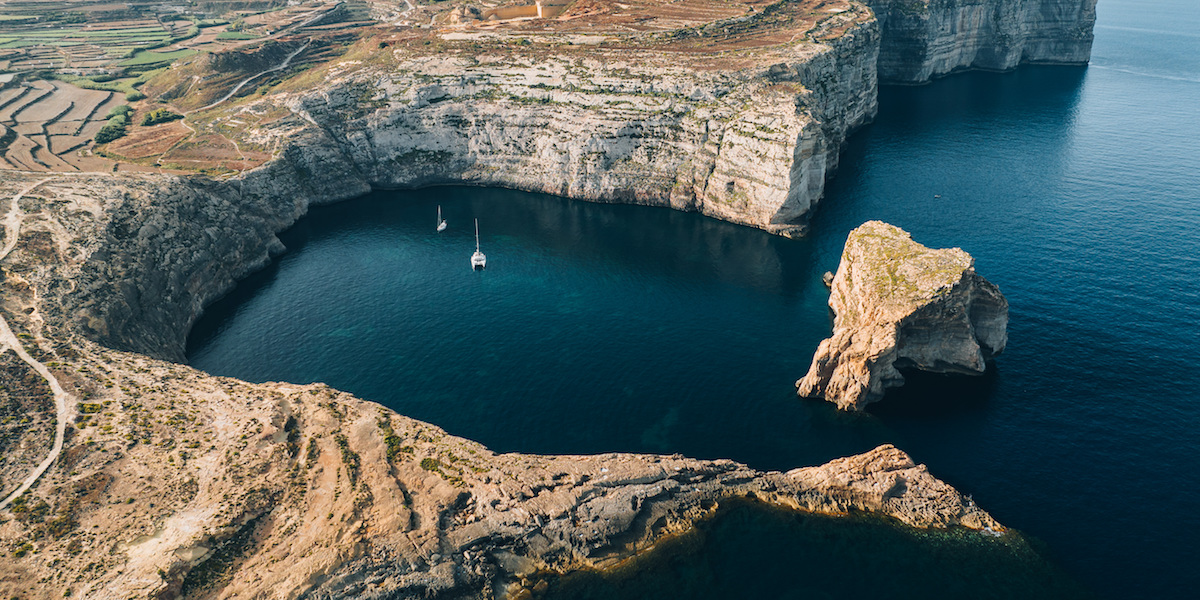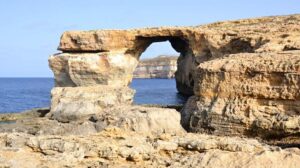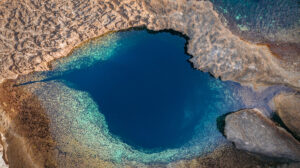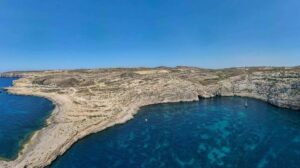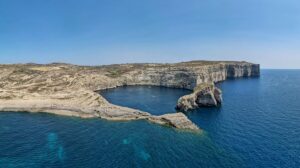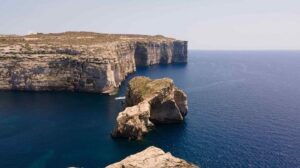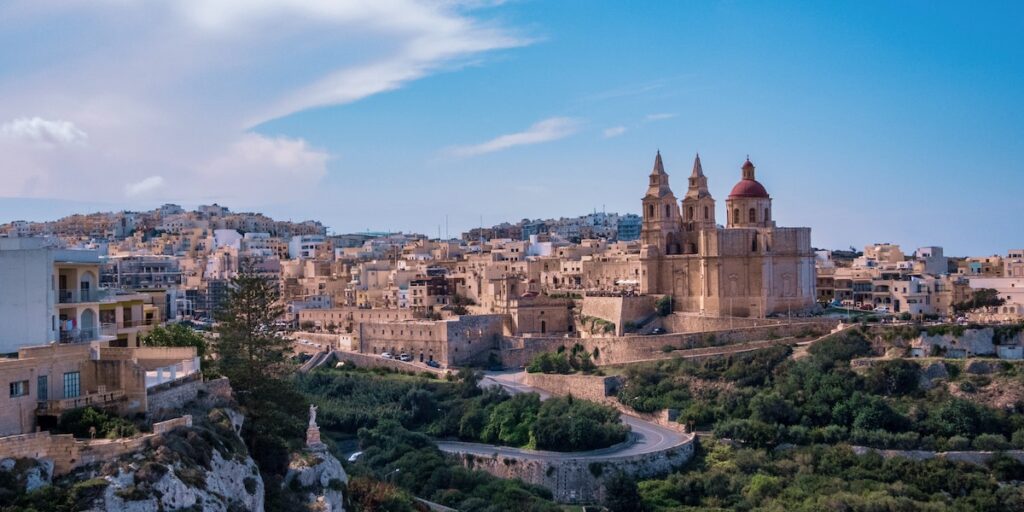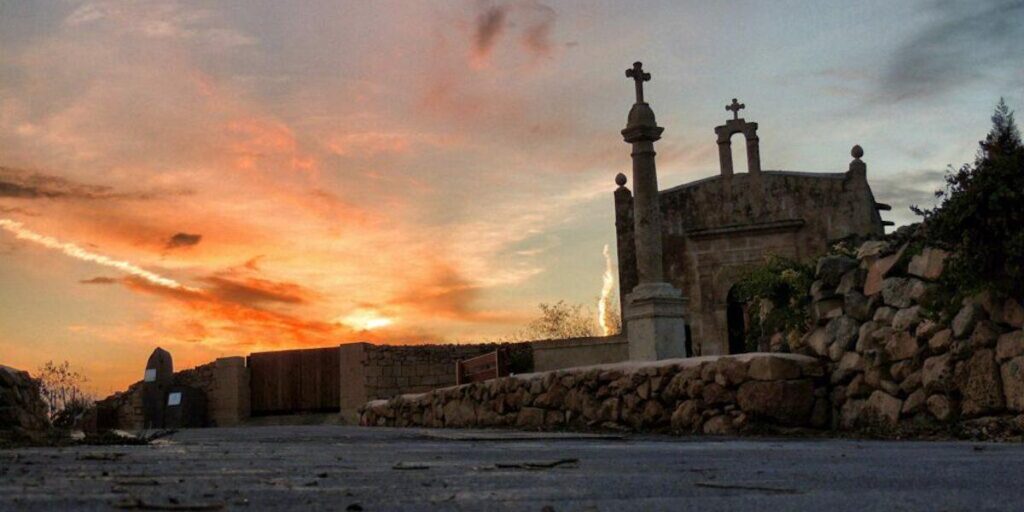Dwejra Bay is located on the picturesque island of Gozo. It was once renowned for its captivating Azure Window. Famously, the natural arch that stood as a testament to the power of coastal erosion collapsed. But, Dwejra Bay is a feat of nature in itself. Here’s how to visit it today.
A Void in the Landscape and Hearts
In March 2017, a storm caused the Azure Window to collapse. The tragedy left behind a void in the hearts of locals and tourists alike. The Azure Window had been an icon, attracting professional photographers, artists, and even featuring in international films and media productions. Nevertheless, as visitors soon discovered, Dwejra Bay offers much more than just the Azure Window. It is a natural haven brimming with diverse wonders.
A Geological Marvel
The coastal landscape of Dwejra is an ever-changing marvel, showcasing an array of extraordinary geological formations. From caves and sinkholes to tunnels, arches, and stacks, both above and below the water’s surface, this enchanting area never fails to captivate the imagination. Gazing at the precipitous cliffs, one can observe the layers of rock that shape the Maltese Islands, bearing witness to the fossils formed millions of years ago.
A Thriving Ecosystem
Dwejra is not just a geological wonderland but also a thriving habitat for a wide range of flora and fauna. From microorganisms to cliff-nesting birds and a vibrant underwater ecosystem, the area has been designated a Marine Protected Area. This recognition has made Dwejra a sought-after diving destination. Enthusiasts can explore its underwater features and encounter the rich marine life that flourishes within.
Inland Sea and St. Anne’s Chapel
One of the fascinating features within Dwejra is the Inland Sea. It is a small lagoon that connects to the open sea through a narrow tunnel. Local fishermen often seek shelter in this tranquil haven during the winter months. In summer, visitors can embark on boat tours through the tunnel. Naturally, this offers a unique perspective of the nearby cliffs and other geological marvels. Overlooking the Inland Sea is the charming St. Anne’s Chapel. It’s the last chapel to be constructed in the Gozitan countryside during the 1960s.
Luxury Accommodation at Kempinski Hotel
If you’re planning to explore the wonders of Dwejra and are looking for a convenient place to stay nearby, consider the luxurious Kempinski Hotel. This 5-star hotel offers a spa and exceptional amenities. When booking, you can even enjoy a 10% discount by using our exclusive promo code “lovemalta.”
Mystery of the Cart Ruts
Adding to the intrigue of Dwejra are the enigmatic cart ruts that zigzag up from behind the chapel towards the towering cliffs. These parallel grooves carved into the rock have been the subject of debate for years. Their creators and purpose are the real mystery, still undiscovered. Similar examples of these ancient tracks can be found throughout the Maltese Islands. Archaeologists and historians have long been fascinated by their origins.

Fungus Rock: A Unique Natural Reserve
Another notable feature in Dwejra is Fungus Rock, a small islet that remains after the collapse of an arch connecting it to the mainland. The Knights of St John, who once ruled over Malta, discovered a unique plant, known as Malta Fungus, thriving on this rock. Despite its misleading name, this plant held significant medicinal value and was highly prized by the Knights. In fact, they even restricted access to Fungus Rock and handed out samples to esteemed visitors, enforcing strict penalties on trespassers. Today, the rock is considered a nature reserve and can only be accessed with special permission for educational and scientific purposes. Remarkably, Fungus Rock is home to a subspecies of lizard found nowhere else in the world.
Dwejra Tower: A Historical Defense
Amidst the natural wonders, the man-made Dweira Tower stands tall. Constructed in 1652 as a defense against pirates and corsairs, this tower was part of a network of fortifications safeguarding the coast of Malta and Gozo. Its role extended to protecting Fungus Rock and the precious medicinal plants that grew there. After serving its purpose for centuries, the tower fell into disuse in the late 19th century before being recently restored and opened to the public.
A Treasure Trove of Natural and Cultural Wonders
Clearly, Dwejra Bay is a site of immense geological, ecological, and historical importance. Its impressive natural features, both above and below the sea, its diverse wildlife and habitats, and its awe-inspiring seascapes continue to entice visitors from far and wide. Despite the loss of the renowned Azure Window, Dwejra Bay remains an enchanting destination, offering a treasure trove of natural and cultural wonders waiting to be explored.
Title image © Malta Tourism Authority with @ollygaspar and @hayleabrown

